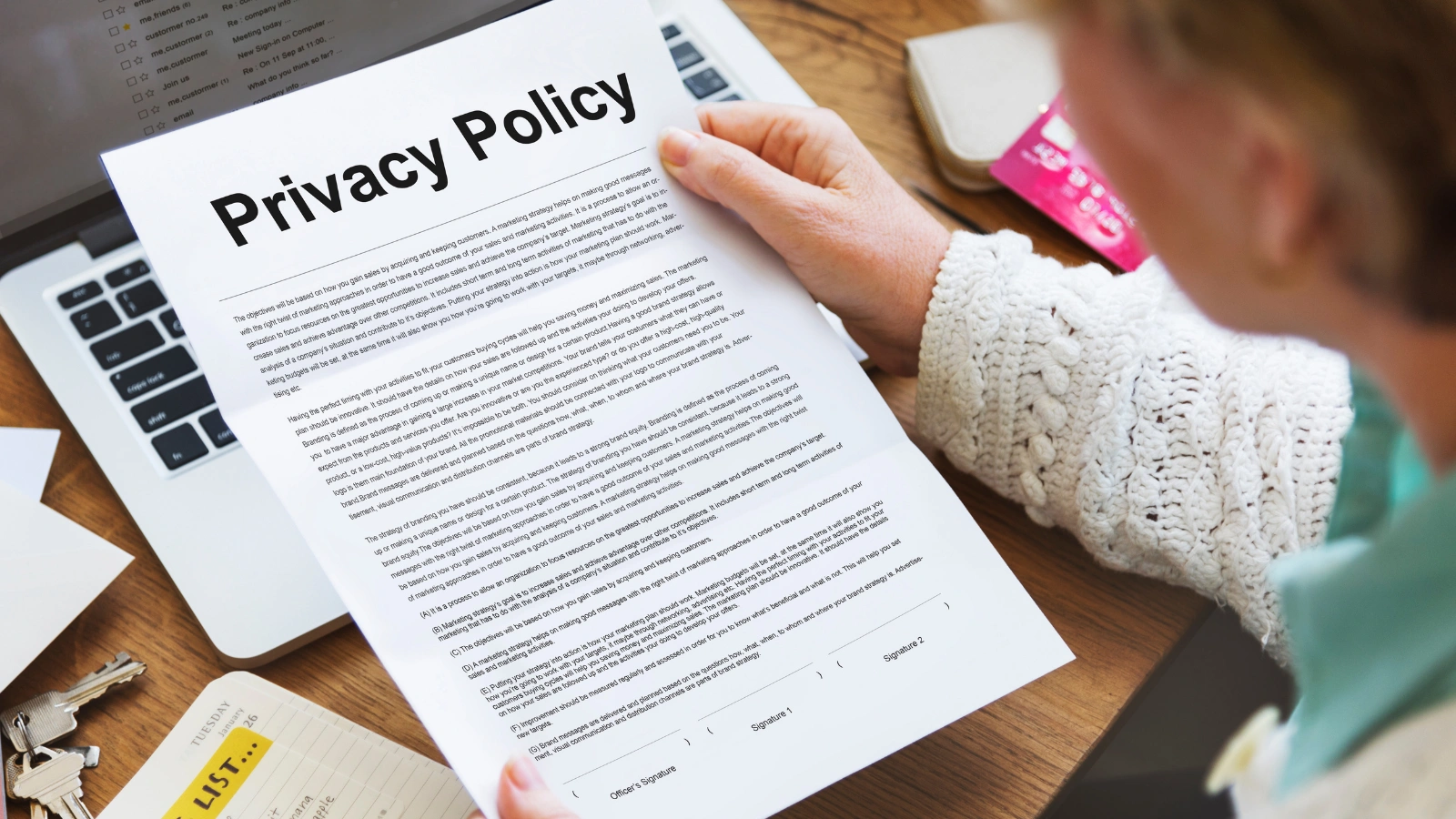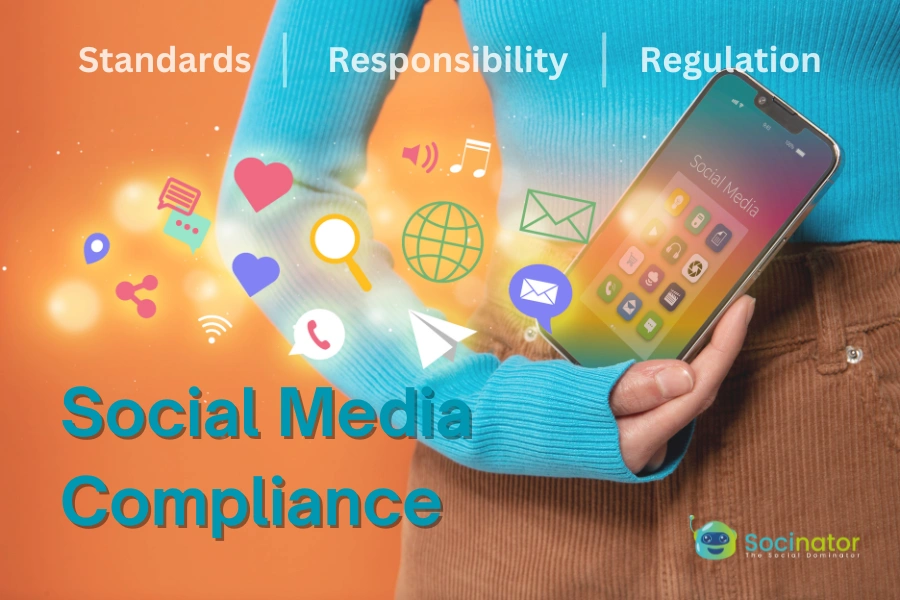Are you using social media to connect with your audience and build your brand? While social media offers incredible opportunities for businesses, individuals, and organizations, it also comes with responsibilities. To make the most of these platforms, you need to follow specific rules and guidelines also known as social media compliance.
It is essential to follow compliance on social media to avoid legal problems, protect your brand’s reputation, and build trust with your audience. It’s not just about following the law—it’s about making sure your online presence is safe and ethical.
This guide is perfect for beginners who want to ensure their social media activities are compliant. Whether you’re a small business owner, a digital marketer, or a casual user, understanding the basics of compliance will help you stay out of trouble and protect your brand.
Let us learn what it is before diving further.
Hit ‘Play’ Button & Tune Into The Blog!
What Is Social Media Compliance?
Social media compliance means following specific rules and regulations when using social media platforms. These rules are set by industry standards, government laws, and company policies to ensure that online activities are legal and ethical.
Compliance covers various areas, such as protecting users’ private information (data privacy), respecting others’ creative work (intellectual property), and being honest in advertisements and promotions. By following these guidelines, you help keep your social media activities safe and trustworthy.
Staying compliant not only protects your business from legal problems and fines but also helps build a positive reputation and trust with your audience.
Why Compliance Matters On Social Media?
 Compliance on social media is important because it helps maintain your brand’s honesty and trustworthiness. It’s not just about following the law; it’s about protecting your brand’s reputation. If you don’t follow the rules, you could face legal trouble, fines, or even harm the brand’s image.
Compliance on social media is important because it helps maintain your brand’s honesty and trustworthiness. It’s not just about following the law; it’s about protecting your brand’s reputation. If you don’t follow the rules, you could face legal trouble, fines, or even harm the brand’s image.
Compliance promotes transparent and ethical communication, which builds trust with your audience. In an era where customers value authenticity, adhering to guidelines like data protection and content accuracy helps prevent misleading claims, copyright issues, improper social media targeting & privacy breaches, all of which can harm your brand’s credibility.
Additionally, proper social media compliance monitoring protects your business against cyber threats and data breaches by enforcing policies that secure sensitive information and respect user privacy. This proactive approach shields your brand from lawsuits and strengthens trust with your audience by showing responsible conduct.
Lastly, staying compliant also puts your brand in a better position to adapt to changing regulations. As social media platforms and legal frameworks evolve, having a robust compliance strategy ensures your brand stays ahead of any new rules or shifts in industry standards, preventing disruptions to your marketing efforts or legal complications.
With numerous aspects of social media compliance to manage, it can be challenging to focus on posting at the right time. In this context, seeking assistance from a reliable social media automation tool like Socinator can be highly advantageous. As a leading choice for businesses and influencers, it simplifies content management and streamlines your social media efforts.
Socinator alleviates your workload by automating posts and actively monitoring content, allowing you to focus on other essential aspects of your strategy. It ensures content meets guidelines, quickly removes non-compliant posts, and provides reports to demonstrate adherence to rules and regulations.
Socinator- Elevate Your Social Media Game with Seamless Automation
 Socinator is a social media management tool crafted to boost users’ visibility and effectiveness across multiple platforms. Its user-friendly design makes managing your social media efforts easy and organized, thanks to its powerful automation features.
Socinator is a social media management tool crafted to boost users’ visibility and effectiveness across multiple platforms. Its user-friendly design makes managing your social media efforts easy and organized, thanks to its powerful automation features.
Here are the top 5 ways Socinator can enhance your social media Public Relations:
Compliance And Security: Socinator ensures your social media accounts remain secure and adhere to each platform’s rules. This helps prevent issues that could harm your brand’s reputation, acting as a safeguard for your online presence.
Audience Engagement: Engaging with your audience is crucial for building a strong brand. Socinator’s automated chatbot features allow you to respond quickly to comments, messages, and mentions. This interaction helps your audience feel connected to your brand and builds their trust.
Consistency: Socinator ensures you can plan and post content regularly across different social media sites. Consistent posting helps keep your audience engaged and familiar with your brand. Without Socinator, maintaining a regular posting schedule can be challenging and time-consuming.
Content Management: Effective personal branding on social media relies on high-quality content. Socinator helps you find and manage content easily, making sure your brand’s message is engaging and aligns with what your audience wants.
Analytics And Insights: Socinator provides detailed analytics to help you understand your audience’s preferences and track how well your posts are performing. This data is vital for refining your social media PR strategy and improving your ad performance.
In summary, Socinator offers a comprehensive solution for social media ad compliance and marketing, making it easier to manage and protect your social media efforts.
Let’s explore some common social media compliance risks that could pose challenges and obstacles in your online journey.
Typical Risks Associated With Social Media Compliance:
 As we discussed earlier, social media compliance rules are in place to safeguard personal data, sensitive information, and other important aspects.
As we discussed earlier, social media compliance rules are in place to safeguard personal data, sensitive information, and other important aspects.
While these rules can differ depending on the industry, there are some common social media compliance risks that every business needs to keep in mind, regardless of their field:
- Data Privacy and Security: Ensuring that personal and sensitive data is protected and not misused.
- Intellectual Property Rights: Respecting copyrights, trademarks, and other intellectual property when creating and sharing content.
- Advertising Messaging: Following rules about how advertisements are presented to avoid misleading or false information.
- Content Guidelines for Social Platforms: Adhering to the specific content rules set by each social media platform.
- Employee Behavior Online: Managing how employees represent the company and interact online.
- Defamation: Avoiding false statements that could harm someone’s reputation.
Being aware of these risks can help businesses navigate their social media presence more effectively and responsibly.
Understanding the laws and regulations related to compliance media policies can be highly advantageous. Let’s delve into these key aspects.
Common Social Media Compliance Laws And Regulations:
In addition to common risks, there are several key social media compliance laws and regulations that every business should be aware of.
Alongside these legal requirements, businesses must also follow each platform’s Terms of Service (ToS). While ToS isn’t a law, violating it can still lead to consequences such as content removal or account restrictions, making it an important part of overall compliance. Understanding the ToS meaning helps clarify what the platform permits, how content should be handled, and which actions could put your account at risk.
Here’s a rundown of important laws to ensure you stay compliant:
Federal Trade Commission (FTC):
This US government agency focuses on protecting consumers from misleading advertising and unfair business practices.
US Food and Drug Administration (FDA):
The FDA oversees the safety of food, beverages, drugs, and supplements. On social media, it monitors posts to prevent false or misleading health claims.
Health Insurance Portability and Accountability Act (HIPAA):
HIPAA is relevant to the healthcare industry, safeguarding sensitive patient information, including medical records and payment details.
General Data Protection Regulation (GDPR):
An EU regulation designed to protect consumer data by setting strict rules on how businesses collect and use information from individuals in the EU.
Financial Industry Regulatory Authority (FINRA):
FINRA ensures that financial firms, including social media influencers, don’t make false or misleading claims.
Family Educational Rights and Privacy Act (FERPA):
FERPA protects the privacy of student education records. It applies to educational institutions and those promoting these institutions.
California Consumer Privacy Act (CCPA):
This law gives California residents more control over their personal information, including the ability to opt out of having their data sold or shared, and to request its deletion.
Copyright and Trademark Laws:
These laws protect creative works and brand names from unauthorized use. This includes ensuring that copyrighted or trademarked content is not misused in social media posts for business or advertising purposes.
Understanding and adhering to these regulations protects your business from legal issues and builds trust with your audience by demonstrating a commitment to ethical practices. Compliance fosters a positive online reputation and contributes to long-term success of your business.
Social media compliance varies by industry, with each sector facing unique regulations. For example, healthcare must adhere to HIPAA, finance to FINRA, and education to FERPA. Adapting to these specific rules ensures lawful practices and avoids industry-specific pitfalls.
Let’s explore a brief overview and discuss the industry-specific differences.
Social Media Compliance Across Different Industries
 Social media compliance is essential for all industries, but it is particularly critical in three key sectors:
Social media compliance is essential for all industries, but it is particularly critical in three key sectors:
- Financial Services
- Healthcare
- Government
These industries are heavily regulated, requiring strict adherence to legal standards to protect confidential information, ensure privacy, and maintain public trust. Let’s learn about them in detail now.
In The Financial Sector:
The financial sector is subject to strict social media regulations, and for good reason. Money matters, as does safeguarding customers’ personal information. In this industry, two key compliance laws stand out:
- FINRA
- Gramm-Leach-Bliley Act (GLBA)
FINRA is a crucial regulation designed to protect consumers from false or misleading claims made by financial institutions, such as banks and insurance companies.
To stay compliant with laws like FINRA when marketing on social media for financial organizations, it’s essential to be transparent. Focus on educating your audience about financial topics, common questions, and issues. However, avoid making exaggerated claims and refrain from sharing personalized information with your followers.
In The Healthcare Sector:
The healthcare industry is highly regulated to ensure the protection of private and sensitive patient information. Two key regulations come into play here, and they must always be a priority when using social media. They are:
- HIPAA
- PHI: Protection Of Health Information
Just like in the financial sector, safeguarding personal and sensitive information on social media requires transparency and the avoidance of unrealistic claims that could lead to misinformation. Since healthcare involves sensitive topics, it is essential for institutions to handle these subjects with great care when discussing them on their social platforms.
In The Government Sector:
Government agencies, ranging from local city and state departments to larger entities like political figures and governing bodies, must adhere to strict regulations on social media.
Social media compliance for these agencies involves several laws, but two key regulations stand out:
- General Data Protection Regulation (GDPR)
- Freedom of Information Act (FOIA)
These regulations are in place to protect citizens, with the primary goal being to prevent the spread of misinformation. Similar to the healthcare sector, government agencies should focus on transparency and sharing useful information without targeting individuals.
To combat misinformation, always share accurate and verifiable content.
Let us now learn about a few tips to ensure social media compliance for your business.
Also Read:
The Ultimate Guide to Social Media Targeting
How To Navigate The New Social Media Landscape
The Ultimate Guide To Effective Social Media Archiving
Top Strategies To Ensure Social Media Compliance For Your Business
Having discussed the risks and regulations related to social media compliance, let’s shift focus to strategies for mitigating these risks. Continue reading to discover five key strategies for maintaining social media compliance within your team and business.
Familiarize Yourself with Industry-Specific Regulations:
The key to maintaining social media compliance for your team is to thoroughly understand the regulations that govern your industry.
As mentioned earlier, these rules can differ across sectors, so invest time in researching which social media laws apply to your business. Additionally, make it a habit to regularly review and update your knowledge on any new or changing regulations.
Since laws and rules can evolve, staying informed is crucial to ensuring ongoing social media compliance.
Monitor Access And Activity On Your Account:
 You’ve probably heard the saying, “Too many cooks spoil the broth.” Apply this principle to managing who has access to your brand’s social media accounts. Restricting the number of team members with access can greatly minimize the risk of breaching compliance guidelines.
You’ve probably heard the saying, “Too many cooks spoil the broth.” Apply this principle to managing who has access to your brand’s social media accounts. Restricting the number of team members with access can greatly minimize the risk of breaching compliance guidelines.
In addition to controlling access, keep a close watch on your social media activity across all platforms, including interactions with posts and engagement with followers. This is especially important in sectors like finance, healthcare, and government.
Even if you don’t share private information in your posts, there’s still a risk that it could be unintentionally revealed through interactions with followers.
Establish A Content Repository Or Library:
Another effective way to ensure compliance with social media guidelines is to create a repository of pre-approved content. By assembling a collection of compliant posts, you streamline your workflow, having ready-to-use content instead of spending time on creation.
A pre-approved content repository allows you to share posts with confidence, knowing they fully adhere to social media compliance regulations.
Your repository doesn’t need to be limited to finished posts. You can also include guideline-compliant templates for various types of content, helping to streamline your content creation process while maintaining adherence to compliance standards.
Provide Proper Social Media Training For Your Team:
Invest in continuous training to educate your employees about proper social media practices and industry-specific regulations. Regular training sessions will keep your team up-to-date with the latest compliance rules and help them identify potential risks.
Since social media regulations can evolve, consistent training ensures that your team remains informed about the latest standards and best practices.
Develop Social Media Compliance Policies:
 Enhance your training efforts by creating a set of social media compliance policies tailored to your business and industry. These guidelines will serve as an ongoing resource, reinforcing the importance of compliance and helping your team manage risks and avoid violations.
Enhance your training efforts by creating a set of social media compliance policies tailored to your business and industry. These guidelines will serve as an ongoing resource, reinforcing the importance of compliance and helping your team manage risks and avoid violations.
Your social media compliance policies should outline the reasons behind compliance requirements and provide practical tips for staying within the rules. Additionally, these policies might cover:
- Processes for content approval
- Acceptable use standards
- Privacy protocols
- Guidelines for employees’ personal social media use
Disclose Sponsored Content:
When collaborating with influencers, it’s essential to disclose all sponsorships transparently.
According to FTC guidelines, content creators must reveal any “material connections” with brands, including personal, familial, and employment ties, not just financial ones.
Make sure to incorporate disclosure requirements into your contracts and agreements with influencers to ensure compliance.
Closing Words:
Social media compliance is crucial for protecting your brand and maintaining trust with your audience. By understanding and following industry-specific regulations, monitoring account activity, and providing proper training, you can avoid potential risks, easily navigate through the social media landscape, and ensure your social media presence remains ethical and effective.
Establishing a content repository and clear compliance policies further supports your efforts, while transparent disclosure of sponsored content helps build credibility. Implementing these strategies will not only keep your business in line with legal requirements but also foster a positive online reputation.
Stay proactive and informed to make the most of your social media opportunities while safeguarding your brand’s integrity.
FAQs
What Are The Advantages Of Adhering To Compliance On Social Media?
Adhering to social media compliance offers several benefits: it helps avoid legal issues and fines, protects your brand’s reputation, builds trust with your audience, ensures ethical practices, and maintains adherence to platform rules. Compliance also safeguards sensitive information and prevents the spread of misinformation, fostering a positive online presence.
What Is Social Compliance Policy?
Social compliance policy involves adhering to a set of ethical and moral guidelines that companies must follow to ensure their products are made responsibly. This includes ensuring sustainability, safety for workers and consumers, and minimizing environmental impact.
What Are The Four C’s Of Compliance?
The four Cs of compliance are Compliance, Connection, Culture and Clarification. Compliance is the first and fundamental aspect, focusing on informing new employees about the legal and social media policy requirements of their roles. It ensures they grasp their rights, responsibilities, and the company’s standards.



